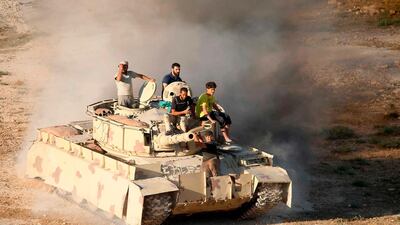The United States has told Syrian rebel factions they should not expect military support to help them resist a Russian-backed government offensive to regain opposition-held parts of Syria bordering Jordan and the Israeli-occupied Golan Heights.
A copy of a message sent by Washington to heads of Free Syrian Army (FSA) groups said the US government wanted to make clear that "you should not base your decisions on the assumption or expectation of a military intervention by us".
The United States had earlier warned Syrian President Bashar Al Assad and his Russian allies that violations of a "de-escalation" zone agreed by the United States and Russia last year would have "serious repercussions" and pledged "firm and appropriate measures".
The toughly worded statements coming from the administration had raised the hopes of the Western-backed opposition of a possible American military intervention in the event the Syrian army's several days long bombing campaign broadens to an all-out offensive across the southwest.
The US message also told the rebels it was left to them alone to take the right decision on how to face the Syrian army's military campaign based on what they saw was best for themselves and their people.
"We in the United States government understand the difficult conditions you are facing and still advise the Russians and the Syrian regime not to undertake a military measure that violates the zone," the message also said.
The United States has supported the moderate mainstream FSA faction with millions of dollars worth of arms and paid monthly salaries to thousands of rebels in the course of the seven-year war under a military aid programme run by the Central Intelligence Agency.
______________
Read more
Syrian regime drops barrel bombs in Daraa
Thousands of Syrian flee as regime steps up bombardment in the south
______________
But analysts believe the aid has dropped after US President Donald Trump decided last year to shut down the programme.
Late on Saturday, Russian jets struck an opposition held town in southwest Syria, opposition sources said, in the first air cover provided by Moscow to an expanding Syrian army offensive.
Since the start of the offensive last week, the Syrian government had mostly deployed artillery and rockets. Russian warplanes that were critical to the recovery of other rebel-held areas were conspicuously absent.
Throwing in Russia's full military weight in the campaign to regain southern Syria will weaken the ability of mainstream rebel groups to withstand relentless bombing on civilian areas that forced their compatriots in other areas to submit to surrender deals.
The southwest is of strategic concern to US-allied Israel, which has this year stepped up attacks on Iran-backed militia allied to Mr Assad.
US ally Jordan, which has been worried by the escalation, said it was engaged in intensive diplomacy with Washington and Moscow to preserve the zone and prevent a wider confrontation.
The loss of opposition-held southern Syria would deal a major blow to the rebel cause.
The southwestern city of Daraa is seen by the opposition as the cradle of the 2011 uprising that began as a peaceful protest movement against Mr Assad's authoritarian rule but has spread across the country and degenerated into civil war.

